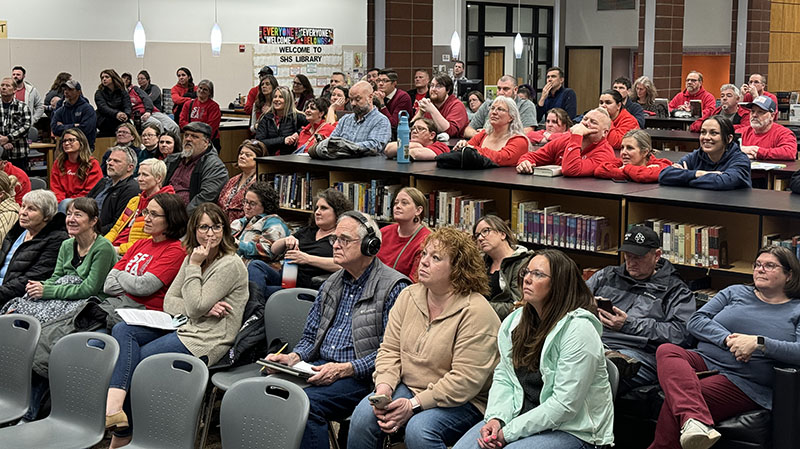By Stephen Floyd
Community members walked away with more answers but no fewer questions about an $825,000 deficit after the Silver Falls School District Board meeting March 11.
An estimated 120 people attended in person and more than 200 watched by Zoom. The large audience was prompted by the deficit projection announced to the board at its Feb. 26 meeting.
Interim Director of Finance Kim Doud said the district will be an estimated $825,000 short of its financial obligations – including payroll – in June. An influx of state education funding is expected July 15. The board has been asked to authorize a way to bridge the gap.
On Feb. 26 the board began discussing a possible tax anticipation note (TAN), which would be a loan against property tax revenue expected in late 2024. While board consensus appears to lean toward a TAN, some members have expressed reservations. SFSD has never utilized this program and interest rates would be unknown until the note is issued.
The board has until April 14 to vote on this option. The state’s application deadline for a TAN is April 15.
In the meantime, a hiring freeze has been in place since the end of 2023, with the goal of reducing current personnel costs to help avoid layoffs and furlough days.
While both potential solutions were discussed at length Feb. 26, March 11 was the first time the board and the public heard the finer details of what led to the shortfall.
In the presentation, Doud said SFSD started the school year with significant overruns. While a $1.5 million general fund carryover was anticipated, that cushion was reduced by $435,403 when the books for the 2022-2023 fiscal year were closed. That plus other budget adjustments led to an actual carryover of only $738,820.
Then, in the course of the year, teacher wages and benefits went beyond the $38.9 million that had been budgeted, Doud said. The current projected overrun in this line item is $2.6 million. She explained this is due in part to the added expense of hiring more experienced teachers as positions came open, as well as other “valuable investments” in educators.
Assistant Superintendent Dan Busch elaborated on the impact Paid Leave Oregon has had on salaries and benefits. He said 10 percent of teachers ended up taking advantage of the program. While the state pays their wages while on leave the district still had to pay benefits during their time off.
Busch said this leave required the increased use of substitute teachers, and when substitutes were not available the district had to hire temporary employees at an increased cost. He said there was also a change in state law defining half days and full days for substitutes, and SFSD unexpectedly had to issue more than $40,000 in substitute wages.
Doud estimated a $290,000 overage in substitute teaching costs for this school year.
Additionally, she said the district expects a more-than $200,000 overrun in utility costs. She said, even though the approved budget accounted for a significant increase in utility expenses, the estimates were still below actual costs.
Utility hikes included a 15.9 percent increase for commercial users by Portland General Electric starting in January.
Doud said the deficit was not just the result of overages, but also a lack of revenue. She said the district has been awarded multiple grants by the state but that Oregon has fallen behind in paying out grant awards.
She added the budget office is continuing to unpack the reasons behind the deficit. Doud said she would “commit to being as transparent as we can” as they learned new information. Doud officially entered the interim position full-time the day of the meeting. She said she was still in the process of getting up to speed with the work of her predecessor, Steve Nielsen.
Nielsen departed SFSD earlier in March to accept a similar position with Oregon Charter Academy. In a statement to Our Town, district officials said Nielsen’s departure “was not, in any way, related to the projected shortfall.”
Following Doud’s presentation, the board thanked her for her thoroughness and dedication to transparency. They also requested additional details in future reports such as an accounting of the grants the state has not paid and a full list of expenses associated with Educational Excellence (EdEx).
EdEx is a continuing education program teachers have been enrolled in since 2020. It has come under fire by teachers who have said the funds could be better-spent on salaries. Deficit talks prompted further scrutiny of ancillary expenses such as substitute teachers while full-time teachers travel and attend, and hospitality for speakers.

